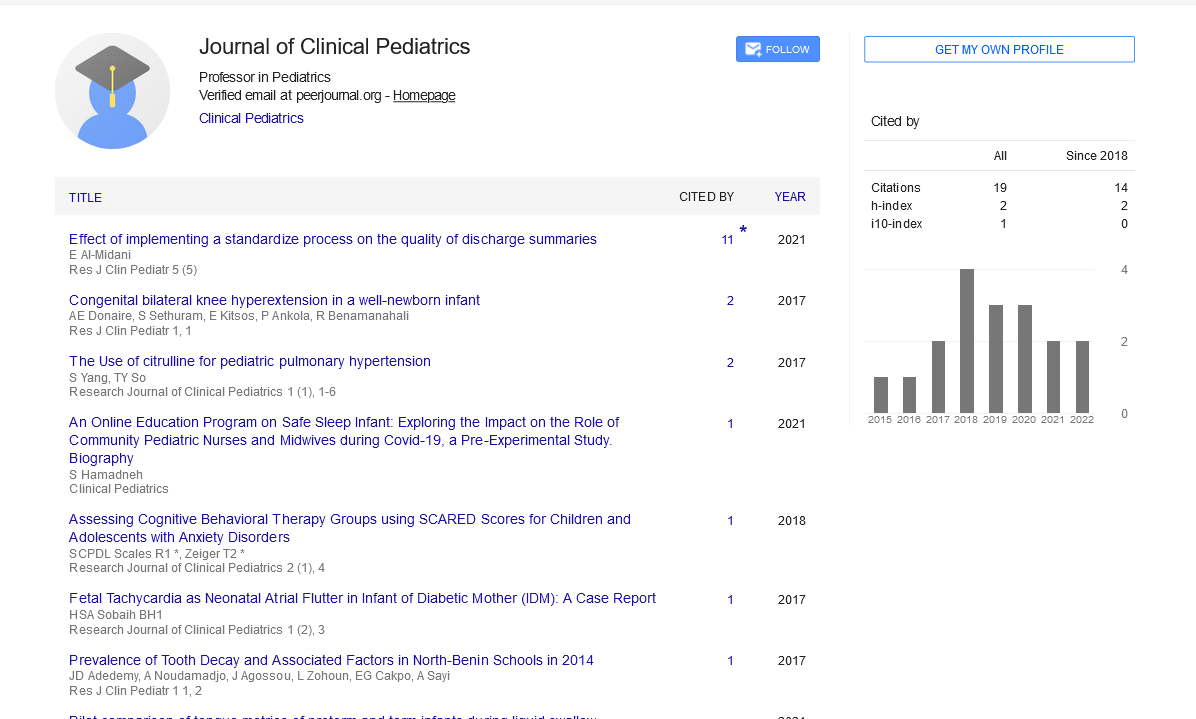Commentary, Res J Clin Pediatr Vol: 7 Issue: 4
Foundations of Child Psychology: Its Challenges and Interventions
Holly Patterson*
1Department of Pediatrics, Emory University School of Medicine, Atlanta, Georgia
*Corresponding Author: Holly Patterson,
Department of Pediatrics, Emory
University School of Medicine, Atlanta, Georgia
E-mail: pattersonholly@emory.edu
Received date: 27 November, 2023, Manuscript No. RJCP-24-128394;
Editor assigned date: 30 November, 2023, PreQC No. RJCP-24-128394 (PQ);
Reviewed date: 07 December, 2023, QC No. RJCP-24-128394;
Revised date: 21 December, 2023, Manuscript No. RJCP-24-128394 (R);
Published date: 28 December, 2023 DOI: 10.4172/rjcp.1000159
Citation: Patterson H (2023) Foundations of Child Psychology: Its Challenges and Interventions. Res J Clin Pediatr 7:4.
Description
Child psychology, a branch of psychology dedicated to comprehending the complexities of a child's mind, development, and behavior, plays an important in shaping our understanding of the early stages of human growth. This discipline delves into the cognitive, emotional, social, and behavioral aspects that define childhood. By exploring various theories, developmental milestones, and influential factors, we gain invaluable insights into the intricacies of children's thoughts and actions.
Understanding the typical milestones children reach at various ages’ aids in gauging their progress. From infancy to adolescence, these milestones encompass motor skills, language acquisition, social interaction, and emotional regulation. Recognizing these benchmarks allows parents, educators, and psychologists to identify potential delays or issues that may require attention.
Several factors influence a child's development. Genetics, environment, parenting styles, socio-economic status, cultural influences, and education all contribute significantly to shaping a child's personality, behavior, and cognitive abilities.
Key areas of study in child psychology
Cognitive development: Exploring how children perceive, reason, and learn is fundamental in child psychology. Cognitive development involves understanding how mental processes evolve, such as problem-solving skills, memory, language acquisition, and abstract thinking.
Emotional development: Understanding emotions and their regulation is important in child psychology. It involves recognizing, understanding, and managing one's emotions, which significantly impacts social interactions, behavior, and mental health throughout life.
Social development: The way children interact with others, form attachments, and develop social skills is a cornerstone of child psychology. This area encompasses peer relationships, family dynamics, social norms, and the development of empathy and cooperation.
The role of caregivers and society
Parenting styles: Various parenting styles significantly influence a child's development. Authoritative, authoritarian, permissive, and neglectful styles impact a child's behavior, self-esteem, and emotional well-being differently. The balance between warmth and discipline shapes a child's worldview.
Education and environment: Schools and educational settings play a vital role in a child's life. The educational environment, teaching methods, peer interactions, and extracurricular activities all contribute to a child's cognitive and social development.
Society's impact: The societal context in which a child grows cultural norms, media influences, and societal expectations plays a substantial role in shaping their beliefs, values, and behaviors. Understanding these influences helps in creating a supportive environment for healthy development.
Challenges and interventions
Behavioral and developmental disorders: Identifying and addressing behavioral and developmental disorders in childhood, such as Attention-Deficit/Hyperactivity Disorder (ADHD), autism spectrum disorders, or learning disabilities, is critical. Early intervention and appropriate support services can significantly improve outcomes.
Trauma and Adverse Childhood Experiences (ACEs): Traumatic experiences during childhood, including abuse, neglect, or witnessing violence, can have profound and lasting effects.
Mental health and well-being: Promoting mental health and wellbeing in children involves providing a supportive environment, teaching coping strategies, and reducing stigma around seeking mental health support. Early identification and intervention for mental health issues are important.
Child psychology is a multifaceted field that unravels the complexity of childhood development. By studying the various aspects that shape a child's growth cognitive, emotional, social, and environmental professionals and caregivers can nurture healthy development. Understanding child psychology not only aids in addressing challenges but also facilitates the creation of environments that support children in flourishing into well-adjusted, resilient adults.
 Spanish
Spanish  Chinese
Chinese  Russian
Russian  German
German  French
French  Japanese
Japanese  Portuguese
Portuguese  Hindi
Hindi 
